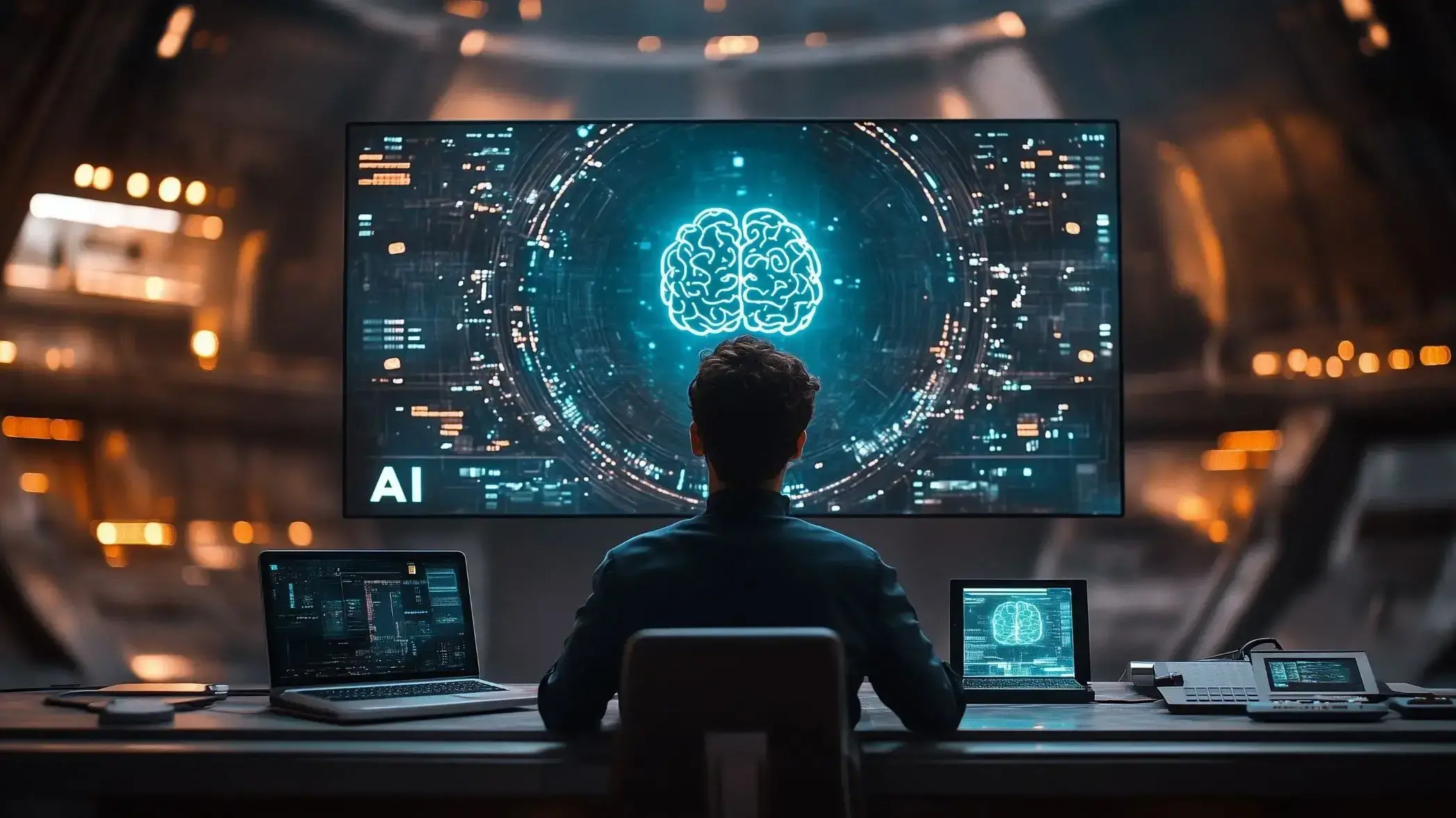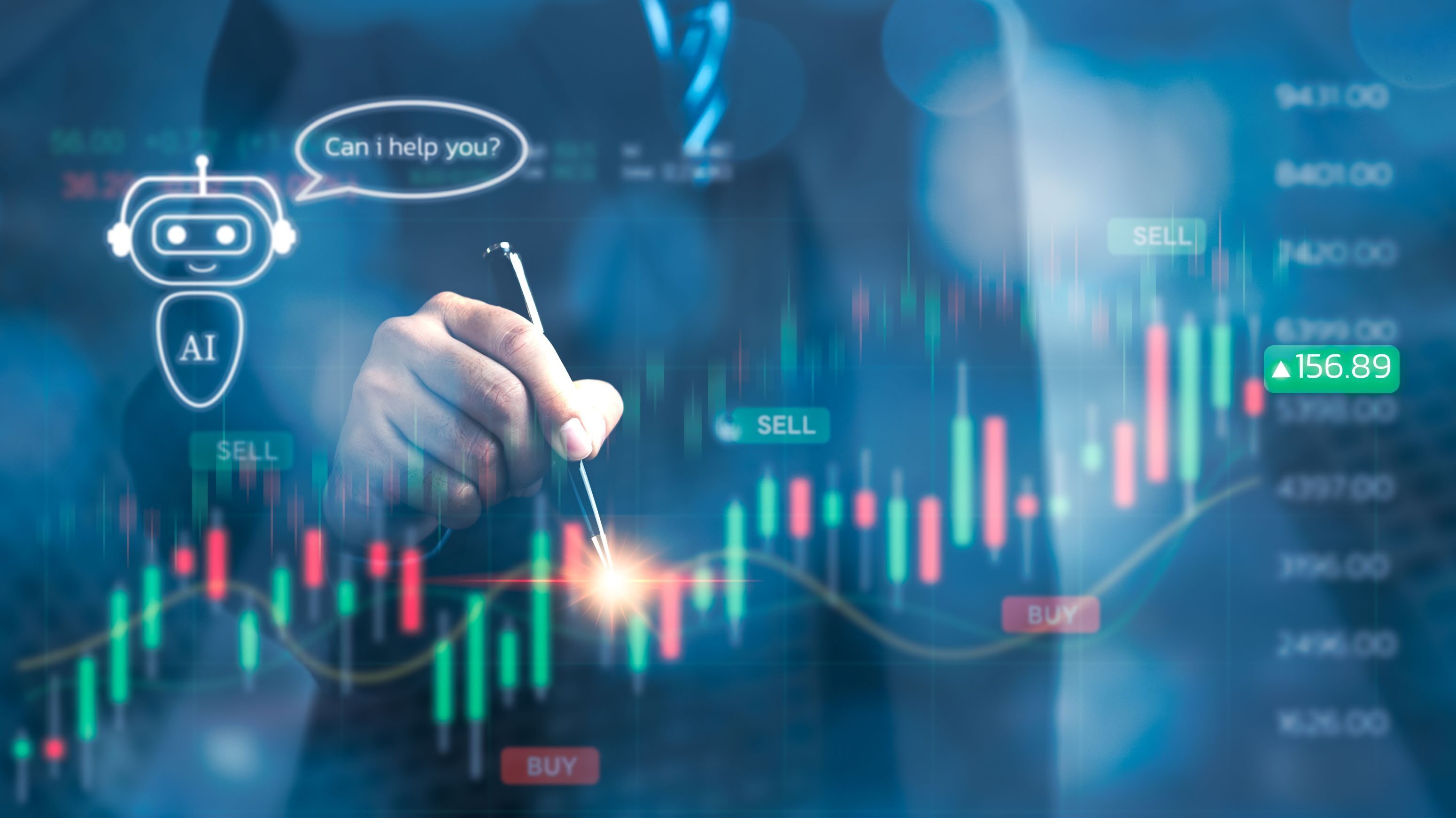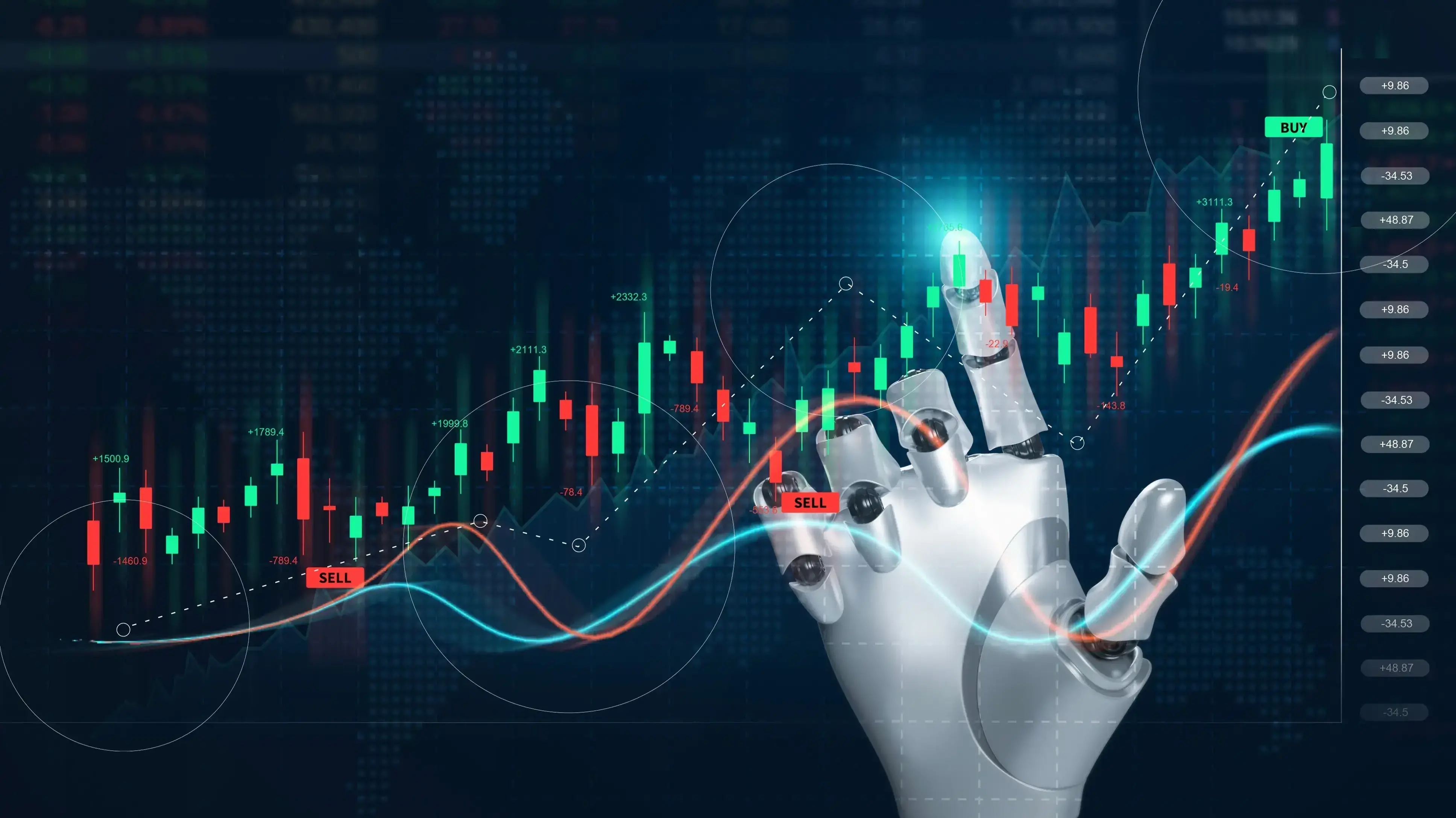Artificial Intelligence (AI) is transforming the cryptocurrency landscape by improving trading, transaction speed, and security through its integration with decentralised blockchain technology.
This synergy enables sophisticated applications like automated trading, fraud detection, and smart contract automation, extending beyond financial sectors into industries like healthcare.
Understanding how AI works with cryptocurrencies is key to unlocking their full potential, emphasising the importance of ethical practices and proper regulation for innovation in digital currencies.
Applications of AI in Crypto
AI revolutionises cryptocurrency trading by employing algorithms to analyse and interpret data, identifying trends and opportunities beyond human capability.
Algorithmic Trading
AI algorithms can perform functions such as determining the patterns in the data or making the trades independently according to the criteria for which they are coded. For instance, this contains plans like arbitrage, trading trends, and sentiment analysis.
Portfolio Management
Through AI-based algorithms, better refinement of cryptocurrency portfolios can be achieved by analysing risk profiles, market conditions, and types of digital assets. They can propose asset allocation, suggest a rebalancing strategy, and make investment choices to increase the return while reducing overall risk.
Market Sentiment Analysis
AI algorithms can process various social media, news, and other sources of information for market sentiment and investor behaviour, as well as analysis. This knowledge enables traders to learn more about market dynamics, spot synthesised trends, and take the right course ahead of price variations.
Blockchain Analytics
AI tools can read out the barcode and blockchain data to track transactions, monitor network activity, and identify dubious activities such as money laundering and financing of terrorism. Through that data, regulators can ensure that business players stick to their anti-money laundering (AML) and know-your-customer (KYC) regulations.
Smart Contracts and Decentralized Finance (DeFi)
By employing AI algorithms, intelligent contracts can enforce conditional transactions and automate different financial transactions without human control, that is, when conditions are not met. In the space of DeFi yields, AI equally stands distinct as its platforms have loaning services, which are automated, smart borrowing, and farming.
Step-by-Step Guide to Creating Basic AI Trading Models for Cryptocurrency
Creating an AI trading model involves a series of systematic steps to design, test, and implement a system that can make informed trading decisions based on data analysis.
Step 1: Understand the Basics
- Familiarise yourself with basic cryptocurrency trading strategies, AI principles, and machine learning algorithms commonly used in trading, such as regression, classification, and neural networks.
Step 2: Data Acquisition
- Collect historical cryptocurrency data which should include prices, volume, and other market indicators from reliable sources, typically available via APIs from popular cryptocurrency exchanges.
Step 3: Data Preprocessing
- Prepare your data by cleaning (removing or correcting anomalies), normalising (scaling input variables to a standard range), and transforming it as necessary (e.g., calculating moving averages).
Step 4: Choose a Model
- Depending on your trading goals, choose a suitable algorithm. For beginners, linear regression for price prediction or logistic regression for buy/sell signals can be good starting points.
Step 5: Split the Data
- Divide your data into training and testing sets to avoid overfitting and underfitting. A common split is 80% for training and 20% for testing.
Step 6: Train the Model
- Use the training data to train your selected AI model. This process involves adjusting the model parameters to best fit the data.
Step 7: Model Evaluation
- Evaluate your model’s performance using the testing set. Assess accuracy using metrics like Mean Squared Error (MSE) for regression models or accuracy score for classification models.
Step 8: Refinement and Optimization
Refine your model by tuning its parameters (like learning rate, and number of epochs) based on the performance metrics.
Enhance model performance by adding or selecting more relevant features.
Step 9: Deployment
Once satisfied with the model’s performance, deploy it in a real-time environment with real money or in a simulation.
Continuously monitor the model’s performance over time, and make necessary adjustments or retrain it with new data.
Step 10: Compliance and Ethics
Ensure your trading practices comply with local laws and regulations.
Maintain ethical standards by avoiding manipulative trading practices.
Benefits of AI in Crypto

Data Analysis: AI algorithms can analyse a vast amount of data from different sources (e.g. market trends, consumer social media sentiments, news articles, and historical price data) to uncover what the algorithm perceives as patterns and trends humans might be oblivious to.
Algorithmic Trading: AI can apply different patterns and algorithms to give automatic buying and selling orders. Machines operate faster than humans, which empowers them to make quick decisions.
Risk Management: AI systems tend to analyse market conditions properly, allowing them to adjust their trade choices as the situation requires. Alongside these, the traders also set up risk parameters to avoid reaching massive losses by them.
24/7 Trading: AI-based thematic trading is a much more fluid and efficient system that does not need any breaks to trade in all time zones.
Reduced Emotion-driven Decisions: Emotions like fear and greed can hamper the decision-makers perception and cause wrong trading decisions. The AI trading system mostly runs based on logic and pre-defined algorithms that remove ("take-out") emotional bias from the trading process.
Backtesting and Optimization: With AI algorithms, you can test them using historical data to evaluate their ability to forecast under different markets. Hence, by honing strategies in a controlled environment, traders can maximise their returns before embarking on actual trading.
Predictive Analytics: Specific AI models apply predictive analytics and make price forecasts based on historical data and current market levels. Though no one can say for sure, they can still help aid traders in their decision-making process.
Top Tools and Platforms for AI-Enhanced Crypto Trading
When diving into the world of AI-enhanced crypto trading, selecting the right tools and platforms can significantly improve the efficiency and success of your trading strategies.
1. TradingView
TradingView provides traders with powerful charting tools and indicators designed for sophisticated technical analysis of crypto markets. Although not exclusively an AI tool, it integrates with scripting languages that enable the automation of trading and the application of machine learning models for predictive analytics.
It is best suited for traders seeking advanced charting capabilities and the flexibility to implement custom AI-driven strategies.
2. Coinrule
Coinrule provides an easy-to-use platform that lets traders automate their trading strategies without needing to write code. It includes machine learning capabilities that help optimise strategies based on historical performance data.
This platform is great for both new and intermediate traders who want to automate their trading using either set or customised rules.
3. 3Commas
3Commas is known for its smart trading terminal and auto trading bots that can execute trades on multiple exchanges. It utilises AI to help manage risks and optimize trading strategies in real-time.
This makes it an excellent choice for traders seeking a comprehensive tool to manage their trades on various platforms with the support of AI.
4. TensorCharts
TensorCharts are advanced cryptocurrency charting tools that include heatmaps, order book analytics, and other advanced charting features that can be enhanced by AI algorithms to predict market movements more effectively.
This platform is ideal for advanced traders who depend heavily on technical analysis and real-time data for decision-making.
5. QuantConnect
QuantConnect is an algorithmic trading platform that supports cryptocurrencies among other asset classes. It allows users to design, backtest, and deploy their trading strategies using its LEAN algorithmic trading engine.
This platform also allows traders to incorporate machine learning models to fine-tune their strategies, making it ideal for experienced traders and developers who are interested in building and testing complex algorithmic trading strategies.
Challenges and Opportunities of Integrating AI with Cryptocurrency
| Aspect | Challenges | Opportunities |
|---|---|---|
| Data Privacy & Security | Privacy concerns due to extensive data needs of AI. Increased security risks with AI-driven attacks and potential manipulation of AI algorithms. | Enhanced encryption methods improving data privacy. AI-driven security protocols can better detect fraud and secure transactions. |
| Regulatory & Compliance | Lack of clear regulations adjusting to rapid advancements in AI and crypto. Regulatory discrepancies across different countries complicating international operations. | Potential for establishing global standards that harness the benefits of AI and crypto integration. |
| Technical Integration | Technical complexities in implementing AI within existing crypto platforms. Scalability issues as blockchain networks and transaction volumes grow. | AI can optimize blockchain processes, increasing efficiency and scalability. |
| Ethical & Bias | Risk of algorithmic bias leading to unfair trading practices. Ethical concerns regarding the role of AI in financial decisions and market manipulation. | Opportunities for more ethical trading practices facilitated by transparent AI systems. AI ethics frameworks developing alongside technological advancements. |
| Market Efficiency | AI's rapid decision-making could lead to volatile market conditions. | Automated trading using AI can enhance market efficiency. Predictive analytics provide investors with powerful tools for decision-making. |
| Accessibility & Inclusivity | Complexity of integrating AI could create barriers for smaller crypto enterprises. | AI tools lower barriers to entry for new traders. Personalized investment services powered by AI can cater to diverse investor needs. |
| Innovation in Financial Products | Potential for overly complex products that could confuse investors or obscure true risk. | Development of intelligent smart contracts. Creation of sophisticated financial instruments like AI-driven funds. |
Ethical Considerations of AI in Crypto
The convergence of AI and cryptocurrency trading presents a host of ethical dilemmas and hurdles:
1. Market Manipulation
AI trading robots, with their high-speed and massive trading volume, can exacerbate disparities among market players by giving an edge to those with access to advanced technology, further destabilising the market.
To address this, it Is essential to introduce high-frequency trading regulations, ensure transparency in algorithmic trading, and penalise fraudulent activities. The primary focus should be on maintaining the honesty and fairness of AI algorithms..
2. Transparency
The obscurity of the logic in AI algorithms used for trading cryptocurrency raises concerns about equity and responsibility, as authorities and market players may struggle to understand their workings, leading to potential misgivings.
To mitigate this, it is crucial to enforce awareness of algorithmic trading strategies, adopt explainable AI to enhance transparency, and work towards standardising transparency measures.
3. Bias and Discrimination
AI methods in crypto trading can exhibit biases based on the data used for training, potentially leading to discriminatory outcomes.
Regular audits of AI algorithms can help reduce these biases and ensure diversity in data and development processes. Additionally, integrating bias detection instruments is crucial to prevent discrimination in trading decisions and ensure fairness in the marketplace.
4. Cybersecurity Risks
AI-powered trading systems face significant risks from cyberattacks and hacking, which threaten market integrity and investor security by exposing vulnerabilities in potentially malicious code.
To enhance security, it is crucial to encrypt and authenticate these systems and protocols. Additionally, conducting periodic security audits and penetration testing is essential to identify and address vulnerabilities in the algorithms used and deployed.
5. Privacy Concerns
AI-powered crypto trading poses significant privacy and data protection challenges due to the processing of vast amounts of personal and financial data, leading to trader reluctance in sharing confidential information.
To mitigate these concerns, AI trading platforms need to adhere to stringent data privacy regulations, protect user data through anonymization, and ensure compliance with relevant laws. Additionally, these platforms must enhance transparency in data collection and require individual consent before processing data.
Companies Leveraging on AI for Crypto Trading
1. GSR: GSR is another example. GSR uses AI-powered algorithms for cryptocurrency trading. The algorithms constantly adjust to market dynamics, delivering profits to clients.
2. Numerai: Numerai is a fund that applies AI and machine learning to the stock market and forecasts in the cryptocurrency market. Data scientists worldwide design trading algorithms on the Numerai platform, which rewards them with cryptocurrency based on the performance of their models.
3. Coinbase: Coinbase, known to be one of the largest crypto exchanges in the world, has AI assisting with trading and possibly other uses. Coinbase Pro uses machine learning algorithms to detect fraud, prevent money laundering, and improve order execution. Their AI-driven tools, like Smart Order Routing, help find optimal prices and execute trades with minimal slips.
Future Direction of AI and Crypto

The future directions of AI and crypto will likely involve deeper integration and innovation across various aspects of the cryptocurrency ecosystem. Here are some potential future developments:
AI-Powered Trading
AI trading strategies based on ML (Machine learning) algorithms are getting smarter and optimal for more complex strategies. It could result in an enhanced level of automation as it empowers intelligent decision-making, including HFT.
Decentralized Autonomous Organizations (DAOs)
AI would enable DAOs to use governance tools, make rational decisions, and optimise the management of resources to improve efficiency.
AI-Driven Security Solutions
The power of AI-driven solutions will be the mainstay in the fight against the constantly evolving cyber threats in the crypto market. Machine learning algorithms can identify and prevent cyberattacks, such as phishing, malware, ransomware and insider threats.
Decentralized Finance (DeFi) Innovations
AI is the leading force in DeFi innovation, automating financial services and delivering better features to customers, thus increasing transparency in the finance industry.
Blockchain and AI Integration
The combination of Blockchain and AI is also a significant concern in the future, as it proposes hybrid solutions that use the best methods of both technologies. This could comprise AI-based distributed consensus protocols, decentralised AI marketplaces, and platforms powered by blockchain technology for data sharing in AI training.
Tokenization of AI Assets
AI algorithms will be treated as digital assets traded on blockchain networks. This implies using AI-as-a-service platforms that would keep subscribers' costs and usage records.
Conclusion
Exploring the dynamic interplay between Artificial Intelligence (AI) and cryptocurrency shows how AI reshapes elements like trading, security, and compliance. AI algorithms enhance market analysis and secure digital assets, with their integration into decentralized blockchain technology improving transaction speed, accuracy, and security, thus transforming the crypto landscape.
AI enables efficient navigation through complex market dynamics via algorithmic trading, portfolio management, and market sentiment analysis. It also advances smart contracts and decentralized finance (DeFi) applications, extending its reach from traditional financial markets to sectors like healthcare. However, integrating AI deeper into crypto trading brings challenges such as data privacy, ethical trading practices, and navigating a fragmented regulatory landscape.
The potential of AI to enhance crypto trading and asset management is evident in various innovative platforms and tools that improve trading accessibility, security, and transaction efficiency. Looking forward, the fusion of AI with cryptocurrency promises more personalized, secure, and efficient financial services, heralding a new era of digital finance focused on transparency and compliance. Embracing these advancements involves supporting ethical practices and deepening the understanding of AI's role in crypto trading.
Frequently Asked Questions
What are AI-powered trading algorithms and how do they impact crypto trading?
AI-powered trading algorithms use artificial intelligence to analyze market data, predict trends, and execute trades automatically. They help reduce human error and can respond to market changes much faster than manual trading, thereby potentially increasing profitability and efficiency in crypto trading.
How do decentralized AI marketplaces contribute to the AI and crypto ecosystem?
Decentralized AI marketplaces allow developers and businesses to buy and sell AI services and computing power on a decentralized network. This facilitates cost-effective access to AI solutions across various industries, enhancing innovation and enabling smaller companies to compete with larger entities.
Can you explain the concept of AI crypto projects like Ocean Protocol and Akash Network?
AI crypto projects such as Ocean Protocol and Akash Network aim to decentralize access to data and computing resources. Ocean Protocol allows for the secure sharing of data for AI training, enhancing privacy and control over data. Akash Network provides a decentralized marketplace for cloud services, offering more power to users at lower costs compared to traditional cloud providers.
What role do trading bots play in the AI and crypto space?
Trading bots automate the buying and selling of crypto tokens on various exchanges using predefined rules or dynamic AI algorithms. They are designed to optimize trading strategies, manage risk, and capitalize on market opportunities 24/7 without human intervention.
How are top artificial intelligence technologies transforming crypto projects?
Top artificial intelligence technologies are transforming crypto projects by integrating advanced AI into platforms to improve functionality, security, and user experience. These integrations help crypto projects handle large volumes of transactions efficiently, predict market movements, and provide enhanced decision-making tools for investors.

Yetunde Salami is a seasoned technical writer with expertise in the hosting industry. With 8 years of experience in the field, she has a deep understanding of complex technical concepts and the ability to communicate them clearly and concisely to a wide range of audiences. At Verpex Hosting, she is responsible for writing blog posts, knowledgebase articles, and other resources that help customers understand and use the company's products and services. When she is not writing, Yetunde is an avid reader of romance novels and enjoys fine dining.
View all posts by Yetunde Salami




















